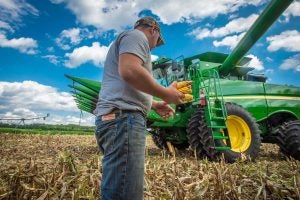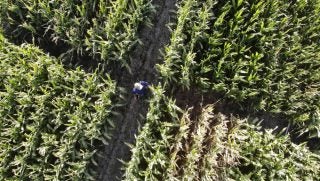I sometimes feel like we live in a world of extremes. Are you a Republican or a Democrat? Are you pro-this, which means you’re anti-that? People want you to take sides — join a tribe.
But what if there was a beautiful common ground? What if, instead of creating a divide, we brought people together? Is it possible for ideas to coexist? In farming, it doesn’t matter if you’re big or small, organic or not. Any farmer can do a good job, regardless of size or label. We all care about animal welfare, soil health, and the environment, among other things.
For me, I’m probably the most neutral person you’ll ever meet. I appreciate all ideas of religion and politics, for example. I’m quite open minded. I want to hear all sides of every topic and am always open to evidence to change my mind. Sadly, I feel I’m in the minority, and many folks are engrained in certain beliefs, refusing to challenge their dogma.

Recently, I found out a soil health expert was coming to speak in our area about water quality. While I appreciate his knowledge on soil health, the misinformation he spreads about GMOs and how farmers should all go organic is just not true. As I’ve previously mentioned here, conservation is a huge part of the job description regardless of label. There are so many myths out there about GMOs, perpetuated at the industry level by organic food companies or “Non GMO”-branded labels. Everyone is trying to sell something — food companies want a bigger piece of the money pie. So when this speaker shares his knowledge of soil health, he has never been a conventional row crop grower, and it undermines his credibility to claim that only organic farmers care about the soil and water. This couldn’t be further from the truth!
I call out this as an example — not to undermine organic whatsoever, but to challenge the views of people like this who feel the need to spread lies or misinformation about the competitor. There is nothing wrong with someone being organic or not, but let’s not change public perception based on bias. The same thing goes for the hardcore GMO lovers who feel the need to undermine small organic farms as being detrimental. If someone would like to share their knowledge of a specific topic, that is great, but they shouldn’t have to put down other methods to sell their message. Stick to the facts, not a persuasive or myth filled agenda. Some folks need to belittle others in order to make themselves feel better. This is a lesson we even learned back in grade school when the bullies would pick on other kids to make themselves feel better, but that doesn’t make it right.
There are some large-scale farmers that treat animals better than small scale. There are some small-scale ones that do it better than the big guys. Sometimes organic farms don’t have to spray chemicals, but this also rings true for non-organic. Sometimes organic farms spray more pesticides than non-organic, sometimes it’s the opposite. It boils down to management or pest pressure, not label. In terms of differences and importances of all aspects, check out this awesome TED Talk by Pamela Ronald. This is a beautiful example of a plant geneticist working on improving crops through GMO technology, while being married to an organic farmer. This example of harmonious coexistence is one we should all be able to honor and realize that it takes a village. It really does takes all types.
Let’s try to see every farming operation for what it is: good salt of the earth people trying to make a living and feed themselves, their communities, or the world. Everyone is special. Everyone creates family memories and puts food on the table in an impactful way, whether that impact is for one child or 1 million. Don’t hate, celebrate!
I would say our farm is medium-sized in the grand scheme of things across the country. You can find me at small local farmers markets, selling our private label farm fresh meats, but you’ll also see some pretty big equipment tending to a couple thousand acres while we farm full time. No hobby here for us — its legitimately how we make our living. Despite our farm size, I’ve been to so many other farms from small hobbies to huge CAFOs with hundreds of thousands of animals. I’ve been impressed with all different aspects and can see the strengths and weaknesses of all different methods. So before judging, take some tours. Ask and learn from folks who do things differently than you. You just may be pleasantly surprised when you open your mind and welcome new ideas.
Michelle Miller, the Farm Babe, is an Iowa-based farmer, public speaker and writer, who lives and works with her boyfriend on their farm which consists of row crops, beef cattle, and sheep. She believes education is key in bridging the gap between farmers and consumers.



